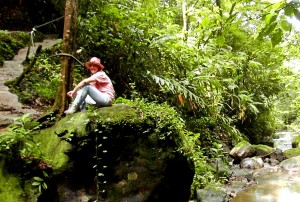Those who dwell, as scientists or laymen, among the beauties and mysteries of the earth are never alone or weary of life. Whatever the vexations or concerns of their personal lives, their thoughts can find paths that lead to inner contentment and to renewed excitement in living. Those who contemplate the beauty of the earth find reserves of strength that will endure as long as life lasts. There is symbolic as well as actual beauty in the migration of the birds, the ebb and flow of the tides, the folded bud ready for the spring. There is something infinitely healing in the repeated refrains of nature-the assurance that dawn comes after night, and spring after the winter. ~Rachel Carson
The Sense of Wonder
Tag Archives: writing
Similes and Metaphors
Every Sunday Creative Nonfiction releases a “Sunday Short Read.” These are always worth reading, and I found this one especially good in its use of similes and metaphors. One can identify with virtually all of them in this piece, and they add a richness that makes the simple ending ever more powerful.
|
|
Poetry is a Presence
From John Berger’s And Our Faces, My Heart, Brief as Photos:
Poems, even when narrative, do not resemble stories. All stories are about battles, of one kind or another, which end in victory and defeat. Everything moves towards the end, when the outcome will be known.
Poems, regardless of any outcome, cross battlefields, tending the wounded, listening to the wild monologues of the triumphant or the fearful. They bring a kind of peace. Not by anesthesia or easy reassurance, but by recognition and the promise that what has been experienced cannot disappear as if it had never been. Yet the promise is not of a monument. (Who, still on a battlefield, wants monuments?) The promise is that language has acknowledged, has given shelter, to the experience which demanded, which cried out. Poems are nearer to prayers than stories, but in poetry there is no one behind the language being prayed to. It is the language itself which has to hear and acknowledge. For the religious poet, the Word is the first attribute of God. In all poetry words are presence before they are a means of communication.
Yet poetry uses the same words, and more or less the same syntax as, say, the Annual General Report of a multinational corporation. (Corporations that prepare for their profit some of the most terrible battlefields of the modern world.) How then can poetry so transform language that, instead of simply communicating information, it listens and promises and fulfills the role of God?
That a poem may use the same words as a Company Report means no more than the fact that a lighthouse and a prison cell may be built with stones from the same quarry, joined by the same mortar. Everything depends upon the relation between the words. And the sum total of all these possible relations depends upon how the writer relates to language, not as vocabulary, not as syntax, not even as structure, but as a principal and a presence.
The poet places language beyond the reach of time: or, more accurately, the poet approaches language as if it were a place, an assembly point, where time has no finality, where time itself is encompassed and contained.
If poetry sometimes speaks of its own immortality, the claim is more far-reaching than that of the genius of a particular poet in a particular cultural history. Immortality here should be distinguished from posthumous fame. Poetry can speak of mortality because it abandons itself to language, in the belief that language embraces all experience, past, present, and future.
To speak of the promise of poetry would be misleading, for a promise projects into the future, and it is precisely the coexistence of future, present, and past that poetry proposes. A promise that applies to the present and past as well as to the future can better be called an assurance.
…
During the 18th and 19th centuries most direct protests against social injustice were in prose. They were reasoned arguments written in the belief that, given time, people would come to see reason, and that, finally, history was on the side of reason. Today this is by no means clear. The outcome is by no means guaranteed. The suffering of the present and the past is unlikely to be redeemed by a future era of universal happiness. And evil is a constant ineradicable reality. All this means that the resolution – the coming to terms with the sense to be given to life – cannot be deferred. The future cannot be trusted. The moment of truth is now. And more and more it will be poetry, rather than prose, that receives this truth. Prose is far more trusting than poetry; poetry speaks to the immediate wound.
The boon of language is not tenderness. All that it holds, it holds with exactitude and without pity, even a term of endearment; the word is impartial: the usage is all. The boon of language is that potentially it is complete, it has the potentiality of holding with words the totality of human experience – everything that has occurred and everything that may occur. It even allows space for the unspeakable. In this sense one can say of language that it is potentially the only human home, the only dwelling place that cannot be hostile to man. For prose this home is a vast territory, a country which it crosses through a network of tracks, paths, highways; for poetry this home is concentrated on a single center, a single voice, and this voice is simultaneously that of an announcement and the response to it.
One can say anything to language. This is why it is a listener, closer to us than any silence or any god. Yet it’s very openness can signify indifference (the indifference of language is continually solicited and employed in bulletins, legal records, communiques, files.) Poetry addresses language in such a way as to close this indifference and to incite this caring. How does poetry incite this caring? What is the labor of poetry?
By this I do not mean the work involved in writing a poem, but the work of the written poem itself. Every authentic poem contributes to the labor of poetry. And the task of this unceasing labor is to bring together what life has separated or violence has torn apart. Physical pain can usually be lessened or stopped only by action. All other human pain, however, is caused by one form or another of separation. And here the act of asuagement is less direct. Poetry can repair no loss but it defies the space which separates. And it does this by its continual labor of reassembling what has been scattered. Three thousand five hundred years ago an Egyptian poet was writing:
O my beloved
how sweet it is
to go down
and bathe in the pool
before your eyes
letting you see how
my drenched linen dress
marries
the beauty of my body
Come look at me.
Poetry’s impulse to use metaphor, to discover resemblance, is not to make comparisons (all comparisons as such are hierarchical) or to diminish the particularity of any event; it is to discover those correspondences of which the sum total would be proof of the individual totality of existence. To this totality poetry appeals, and its appeal is the opposite of a sentimental one; sentimentality always pleads for an exemption, for something which is divisible.
Apart from reassembling by metaphor, poetry reunites by its reach. It equates the reach of a feeling with the reach of the universe; after a certain point the type of extremity involved becomes unimportant and all that matters is its degree; by their degree alone extremities are joined. Anna Akhmatova:
I bear equally with you
the black permanent separation.
Why are you crying? Rather give me your hand,
promise to come again in a dream.
You and I are a mountain of grief.
You and I will never meet on this earth.
If only you could send me at midnight
a greeting through the stars.
To argue here that the subjective and objective are confused is to return to an empirical view which the extent of present suffering challenges; strangely enough it is to claim an unjustified privilege.
Poetry makes language care because it renders everything intimate. This intimacy is the result of the poem’s labor, the result of the bringing-together-into-intimacy of every act and noun and event and perspective to which the poem refers. There is often nothing more substantial to place against the cruelty and indifference of the world than this caring.
From where does Pain come to us?
From where does he come?
He has been the brother of our visions
From time immemorial
And the guide of our rhymes.
. . . writes the poet Nazuj ak Nak’-ika.
To break the silence of events, to speak of experience however bitter or lacerating, to put into words, is to discover the hope that these words may be heard, and that when heard, the events will be judged. This hope is of course at the origin of prayer, and prayer – as well as labor – was probably at the origin of speech itself. Of all uses of language, it is poetry that preserves most purely the memory of this origin.
Every poem that works as a poem is original and original has two meanings: it means a return to the origin, the first which engendered everything that followed; and it means that which has never occurred before. In poetry, and in poetry alone, the two senses are united in such a way that they are no longer contradictory.
Nevertheless poems are not simple prayers. Even a religious poem is not exclusively and uniquely addressed to God. Poetry is addressed to language itself. In a lamentation, words lament loss to their language. Poetry is addressed to language in a comparable but wider way.
To put into words is to find the hope that the words will be heard and the events they describe judged. Judged by God or judged by history. Either way the judgment is distant yet the language, which is immediate and which is sometimes wrongly thought of as being only a means, the language offers obstinately and mysteriously, its own judgment when it is addressed as poetry. This judgment is distinct from that of any moral code, yet it promises, within its acknowledgment of what it has heard, a distinction between good and evil – as though language itself had been created to preserve just that distinction!
All Writers Are Vain . . .
“All writers are vain, selfish, and lazy, and at the very bottom of their motives there lies a mystery. Writing a book is a horrible, exhausting struggle, like a long bout of some painful illness. One would never undertake such a thing if one were not driven on by some demon whom one can neither resist nor understand. For all one knows that demon is simply the same instinct that makes a baby squall for attention. And yet it is also true that one can write nothing readable unless one constantly struggles to efface one’s own personality.” – George Orwell, “Why I Write”
The Power of Memoir
A faraway relative wrote me at Christmas to say she had read Letters from the Pacific and liked it, and that she had keyed particularly to things relating to family. “We have more in common than I thought,” she wrote, and it struck me forcefully that she and I – who haven’t seen each other in 30 years and who write only at Christmas – were able to connect across time and space through the telling of a very small part of my personal journey.
It also struck me that she and I, while experiencing such similar feelings, have arrived at such different places. I had written:
Day Three, at Sea: I am remembering, as I look out at an almost full tropical moon and smell the sweet night as the sky begins to pale over the Pacific, that my father was in these waters at the end of the war. It was from a ship somewhere out here that he wrote that horrified letter to his Admiral after the bombs at Hiroshima and Nagasaki. In the letter, he sounds like an outraged, disillusioned youth – almost as if he hadn’t yet seen Omaha Beach, with the bodies rolling in the surf and the shells screaming overhead. Maybe with Hiroshima, he finally had enough of killing and death. When I was growing up, he never talked about the war. Being here reminds me of this Pacific connection to him – pacific connection, after all the rage at his abuses – and it occurs to me that I would like to go through his papers once more. After he died, I could only skim them, didn’t even want to touch them. Now, here, another notch in my ability to forgive him seems to have clicked into place. I go up to watch the sunrise from the observation deck. All alone out here, with nothing but the balm of a peaceful sea.
Writing this was the first moment on that amazing journey when I was able to look back with calm, past the anger, and realize that forgiveness was what I was really searching for. It’s taken me a long time to find it, but feeling the faint tectonic shift on that peaceful dawn established me on the path. Out there on that wide ocean, I was beginning to discover the healing power of memoir.
And now I see that the power of memoir to touch the hearts of others is a testament to the commonality of human experience; that each of us, however, has a special “take” on that experience that, in the expression, can draw us closer; and, finally, that none of us is as unique as we think we are.
© Sandra Shaw Homer
Pensamientos Navideños: Holiday Thoughts on Rewriting a Life
This essay first appeared in The Tico Times 20 years ago as Pensamientos Navideños.
The coffee pickers are in the fields full-time now. I can see them on my morning walk, both in our neighbor’s field and in the giant cafetal that climbs the steep hill on the other side of the river: small human forms balancing their baskets in front of them, reaching deep into the dark foliage, stripping one branch after another, moving steadily along the rows, sure-footed on the steep slopes. As hard as this work is, it is a cheerful time. At dawn, I hear their voices calling to each other, and this bantering goes on all day, sometimes punctuated by a line of song.
Coffee season means we are approaching Christmas. For the pickers it means a few sheets of galvanized metal for the roof of the new house, school uniforms for the coming year, a new ceramic or wooden figurine for the crèche (portal), a pair of shoes.
As the coffee baskets are rapidly filled, they are dumped into sacks, and the pickers drag or shoulder their sacks to the collection point where the coffee is weighed and the colones are paid. Men, women and children – whole families – pick coffee, and these few weeks out of the year are enough to ensure relatively good economic times . . . at least for a while.
When I first came to Costa Rica I was amazed at how labor-intensive these crops are, but on such precipitous terrain no machines could do this work. Now I have grown accustomed to seeing people in the fields, and it is their cheerful calling to each other that first puts me in mind of the coming holidays – a better reminder than the sudden appearance of Salvation Army Santa Clauses on slushy city street corners, I’m thinking.
Year’s end always makes me pause and reflect on the changes in my life since moving to Costa Rica. Over the years I have learned some important lessons – far beyond losing my fear of driving on mountain roads with no guard rails, discovering the joys of communicating in a new language or adapting to the courteous ways of the people around me.
I suppose you don’t have to move to a foreign country to rewrite a life, but you do have to get away from everything familiar that binds you to your old self. Another culture is so different that it forces this rebirth much more dramatically. It is often painful, but if you choose to be open to it, let go your defenses, take joy in what’s around you, you’ll find it reflecting back at you something new, something you never knew was there, a self you never had time for before.
Here in Costa Rica I have learned that I believe profoundly in the power of family; that I can be a generous person; that a single orchid or a new-hatched hummingbird can fill me up; that being a good neighbor is better than guarding my privacy; that I have more patience than I ever thought I did; that to welcome a stranger is not a waste of time; that charity is personal; that connection with others is the most important thing in life; that personal growth is a choice and, once it starts, it will not be stopped; and that, even though what remains to me of life is less than it was when I first arrived here, I have all the time in the world.
Finding the Heart of Writing
(Adapted from a presentation given at Allyson Latta’s 2012 writers’ workshop in Costa Rica)
Point of view
Many years ago, I fell in love with Joseph Conrad. I read every single book and story, one right after another. I got excited. He gave me hope. Not that I could write as compellingly as he, but that I could have a point of view, a perspective worth sharing. At the time I didn’t know what this might be, but I certainly could identify with his. I loved his capacity for close observation and at times thrilling description, but most of all I loved his humanity, his understanding of the inner workings of people, their secret selves and what makes them choose the evil or the good. And I especially enjoyed his delicately ironic sense of humor, since I shared something similar myself. In spite of having spent hundreds of hours in literature classes, this was the first time I “got it” that writers must write from a personal worldview, and it gave me courage.
I was forty-something and, fortified by Conrad, I decided to start writing on purpose, and this was part of my motivation in moving away from a high-stress job to another country – Costa Rica – where I imagined I could get a better handle on just that. There were plenty of false starts, and life got in the way a lot (moving to another country is not an unstressful thing to do), but over time I honed my skills and learned plenty of important lessons. But what to write about? Here’s where the sense of place enters the story.
A sense of place
Living in a foreign culture eventually strips you clean of all the cultural encrustations you’ve accumulated in your previous life and leaves you naked and vulnerable. For some, this is a terrifying experience of helplessness. For others, it’s an adventure of discovery – not just of the other language and culture, but of yourself, of what really matters to you. Living in Costa Rica, I found that my values firmed up about things I really hadn’t given a lot of thought to before.
But how to write in such a way that your readers can “see” it the way you see it? You have to describe things – accurately, lyrically, whatever way you want – but in order to do any of these you have to observe closely – physically and emotionally – whatever it is you want to describe. It was this exercise of close observation that resulted the deep sense of place that informs my forthcoming memoir, Evelio’s Garden. The most important lesson this work taught me, from a writer’s point of view, was to close my eyes and go there, wherever that was, into the quiet place where the words – amazingly – just came.
Telling the truth
I had a big problem with truth for a lot of years. I would go back over something I’d written and find it just didn’t jibe with something real inside me that I couldn’t put my finger on. Maybe we all face this in the beginning, the desire to reinvent ourselves through language or stories, and we find that they don’t quite ring true – I mean true to the human experience, not true to the facts. Some of us need a lot of living before we can find this truth, and it can take great courage to face it, and then, ultimately, to tell it. After all, what do we have to lose? Realizing this, I finally found that truth exists only in the place where acceptance lies.
The truths of the human condition haven’t changed much – like the 100 great plots, they’re familiar to us all. But with an understanding of our own personal truth, each of us can bring a unique perspective to the human story. Anonymous was right when she/he wrote that writers write not because they want to say something, but because they have something to say. And that “something to say” must ring true.
Writing from the heart
All writing is really best if it teaches us something. What does what I have experienced or lived have to offer you? How can the way I put something down on paper help you to experience it more deeply, or in a fresh way; make you reflect, or stop for just a moment to say to yourself, “Ah, that’s the way it is”?
Writing makes me feel more alive because it forces me into each moment I describe in a way that can make connections with others. Feeling the thing observed, the moment, and then describing it so that someone else experiences that same moment through one’s words – these are moments of truth shared. It is in this heightened awareness, in this search for connections that we really exist as writers.
This was brought home to me not long ago in intensive care, when I was on a respirator and couldn’t speak. Fortunately, I had a notebook with me, and I could write brief requests or comments to the staff and doctors. It interested me how intently everyone followed the act of my writing. I would signal in the air that I wanted to scribble, they would rush to find my notebook, pen and glasses (never in the same place twice), and then they would peer over my shoulder to see what I was going to “say.” It occurred to me then that they attached so much importance to what I wrote because I was writing it to them. Being the intended recipients of the written word made them feel important. Connections being made. In this light, we can almost see writing as an act of love.
© Sandra Shaw Homer, 2014





